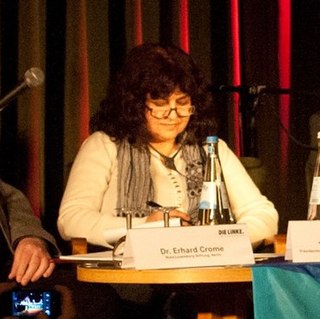A Quote by Rachel Cusk
In domestic life, the woman's value is inherent, unquantifiable; at home she exchanges proven values for mythological ones. She 'wants' to be at home, and because she is a woman, she's allowed to want it. This desire is her mystique, it is both what enables her to domesticate herself and what disempowers her.
Related Quotes
In domestic life the woman's value is inherent, unquantifiable; at home she exchanges proven values for mythological ones. She "wants" to be at home, and because she is a woman she's allowed to want it. This desire is her mystique, it is both what enables her to domesticate herself and what disempowers her.
Where woman has taken her place in business she has found her method ready-shaped for her, and following that, she does her work,if with a certain amount of monotony, yet without undue fatigue. Her hours are fixed, and as a rule she gets needful change of scene as she goes to her business and returns to her home or the place where she lives. But the "home- maker" has not, nor can she have, any such change, and her hours are always from the rising of the sun beyond the going down of the same.
The constitution has put women in a position where no one will protect them from religious cliques. If a woman is the third or the fourth wife and she has no rights inside her home and, on top of that, there is domestic abuse in her house, she is doomed. Under Islamic Sharia law a woman must accept beatings from her husband. Under Islamic Sharia, she must not revolt because she is the third or fourth wife.
I think the relationship [in Aquarius] with her nephew shows that she's not nostalgic. She just wants to preserve what is important to her - her records, her books, even some furniture. She doesn't want to leave that house because it is her home. That is where her kids were born. After moving so much in my life, I was touched by Clara's need to stay in that apartment. I love her life, and that may be why I connected to her so strongly. We are the most alike when we are fighting for our rights.
She stared at herself in the mirror. Her eyes were dark, almost black, filled with pain. She'd let someone do that to her. She'd known all along she felt things too deeply. She became attached. She didn't want a lover who could walk away from her, because she could never do that - love someone completely and survive intact if her left her.
The strongest reason why we ask for woman a voice in the government under which she lives; in the religion she is asked to believe; equality in social life, where she is the chief factor; a place in the trades and professions, where she may earn her bread, is because of her birthright to self-sovereignty; because, as an individual, she must rely on herself.
For a mother the project of raising a boy is the most fulfilling project she can hope for. She can watch him, as a child, play the games she was not allowed to play; she can invest in him her ideas, aspirations, ambitions, and values - or whatever she has left of them; she can watch her son, who came from her flesh and whose life was sustained by her work and devotion, embody her in the world. So while the project of raising a boy is fraught with ambivalence and leads inevitably to bitterness, it is the only project that allows a woman to be - to be through her son, to live through her son.
Was not Hypatia the greatest philosopher of Alexandria, and a true martyr to the old values of learning? She was torn to pieces by a mob of incensed Christians not because she was a woman, but because her learning was so profound, her skills at dialectic so extensive that she reduced all who queried her to embarrassed silence. They could not argue with her, so they murdered her.
A queen is wise. She has earned her serenity, not having had it bestowed on her but having passer her tests. She has suffered and grown more beautiful because of it. She has proved she can hold her kingdom together. She has become its vision. She cares deeply about something bigger than herself. She rules with authentic power.
The extraordinary woman depends on the ordinary woman. It is only when we know what were the conditions of the average woman's life - the number of children, whether she had money of her own, if she had a room to herself, whether she had help bringing up her family, if she had servants, whether part of the housework was her task - it is only when we can measure the way of life and experience made possible to the ordinary woman that we can account for the success or failure of the extraordinary woman as a writer.






































